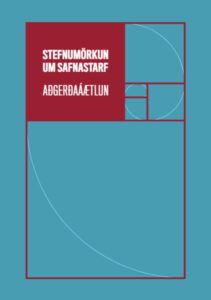
According to the Museum Act, one of the roles of the Museum Council is to work on Policy on museum work which was prepared in collaboration with the main museums and approved by the Minister in 2020. This was the first published strategy for museum work to be approved by the Minister and presented to the Government and is useful for defining tasks and managing the responsibilities of museums, their owners and supervisory bodies. Subsequently, work began on the implementation part or The action plan.
The Action Plan, like the strategy, involved in-depth consultation with stakeholders, both through meetings and presentations under the direction of Jóhanna Símonardóttir from the consulting firm Sjá. Preparations for the action plan began with a workshop at the FÍSOS mobile school in October 2021 in Stykkishólmur. In the fall of 2022, a working group was appointed to work further on the action plan, and the working group consisted of eight people; representatives of the main museums and recognized museums as well as representatives of the museum council. It was emphasized that the actions would reflect seven main goals Policy on museum work.
This action plan is intended to support the Strategy for Museum Work but also the Action Plan Cultural campaign, Iceland's Cultural Policy Action Plan.
The action plan was prepared in the spring of 2023 and presented to the Minister on June 19 of the same year to good acclaim. The validity period of this first action plan is 2023-2026. After that time, it will be reviewed and a new action plan will be prepared.
The main actions in the plan are six:
The action plan contains six main actions that work towards the goals of the policy and also outline the focus areas for the next three years. The validity period of this first action plan is 2023-2026. After that time, it will be reviewed and a new action plan will be prepared. Sub-actions are actions that are under the main actions and can range from 2-5 points for each action.
Here is a summary of the major actions:
- Museums for all – an introduction to museum work
The first action discusses the importance of considering equal access for all to cultural and natural heritage. The emphasis is on the fact that museums are for everyone, are inclusive and reflect the multiculturalism in the country. Museums are encouraged to be visible, strengthen ties with the local community on current issues. As well as considering cooperation between domestic and international institutions - there will also be systematic work on promoting museums in joint plans and collaboration with key stakeholders.
- Infrastructure development
Museum councils are an important link in the country's cultural administration. Strengthening the infrastructure involves strengthening museum work in the country. The supervisory role of the museum council is an important tool for increasing cooperation and supporting professional museum work, sharpening the responsibility of owners to museums through museum ownership policies. A clear ownership policy combined with strong supervision by the museum council increases the quality of museum work.
- Professional work – the foundation of the protection of cultural and natural heritage
Museum policies need to reflect how the museum's professional work is done. Consideration should be given to the future registration system for museums in Iceland and to ensuring that museums have specialized storage spaces and even exploring collaboration on storage spaces. Emphasis will be placed on registering and researching museum assets, especially those that may be considered at risk, for example due to climate and natural hazards, and prioritizing what should be protected.
- Knowledge preservation and museum collaboration
There is a great deal of expertise in various fields in museum work, and it is ideal to share the knowledge that is created in the work. A knowledge portal, which is a website where manuals and information can be shared, could become a powerful tool for sharing the experience and knowledge that is created in museum work.
- The educational role of museums
There is a tradition of strong educational work by museums in collaboration with all levels of the education system. Ways need to be sought to further strengthen educational work with an emphasis on increasing the importance of natural and cultural heritage in education. For example, strengthening ties with the university and academic community through good access to collections and joint research, internships and involvement in teaching.
- Knowledge creation in museums and academic work
All knowledge creation is the basis for academic research. One of the fundamental aspects of the work of museums is research and the dissemination of its results. It is also important to facilitate access to primary data to support research work and to ensure that the preservation of primary data and registration are in accordance with the requirements of registration standards. Collaboration with universities and the academic community on research, internships and projects is beneficial to all parties and yields new knowledge.
Some of the actions have broad implications for the strategy, but many actions are already being implemented – but it is important to highlight the good work that is already being done in museums and not necessarily a reason to invent new projects, but to elevate and nurture the projects that are already in place.
The societal role of museums is currently in focus. Museums are for everyone and all groups in society should feel welcome in museums both as active participants and visitors. A clear policy, both from museums and governments, is one of the prerequisites for the role of museums, their operational goals and the broad impact of museums in society to be visible.
The action plan was presented at the Annual Meeting of the Capitals on January 23, 2024. Here you can watch the Annual Meeting and the presentation of the action plan by Þóra Björk Ólafsdóttir, CEO of the Museum Council.
The action plan is available to everyone on the Museum Council's website here.
